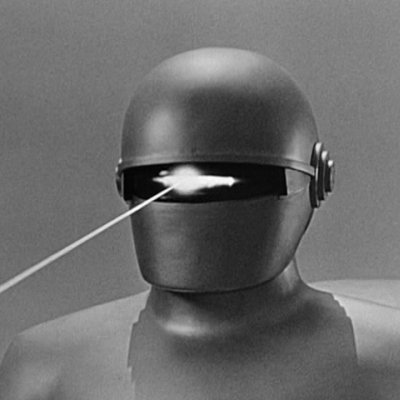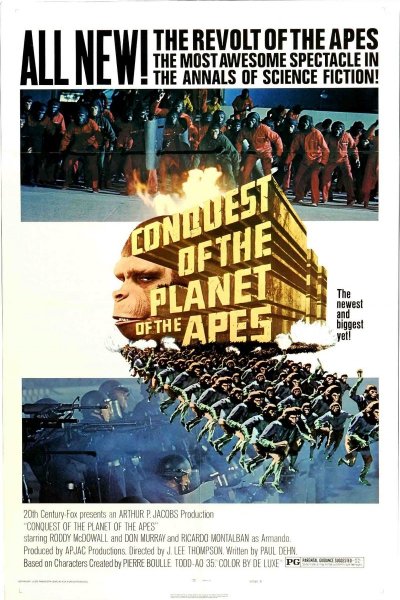The following is actually from 2009, written several months after finally watching the movie in question.

In the original 1951 The Day The Earth Stood Still, Klaatu claims to come to Earth in peace, bearing a message that must be delivered to all of the people of Earth at once. The message is: “give up your violent ways and machines of war, or the Earth will be eliminated.” As a demonstration of his power, Klaatu neutralizes electricity everywhere except where safety would be compromised. The Earth effectively stands still. Prior to this demonstration, Klaatu’s companion—the robot Gort—demonstrates some power of his own by using an energy ray to vaporize offensive weapons without harming the men wielding them.
Okay, so, the people of many other planets are so worried about Earth’s propensity toward violence and discovery of atomic weapons, that they send someone down to warn Earth to cut it out or be destroyed. These people of many other planets are so technologically advanced they can neutralize the fundamental forces, and turn matter into harmless energy. And yet they are worried about Earth and its primitive atomic weapons and pea-shooters? They are worried about a people who haven’t figured out how to travel faster than the speed of sound yet?
Yes, it’s a stretch, and it doesn’t stand up to close scrutiny, but it’s still classic science fiction, and still one of my favorite movies of all time. I’m pretty certain I first saw it on a Saturday afternoon in 1974 on television.
Thirty-four years later, they made a re-make. This re-make follows, with the same level of quality, re-makes of other movies listed among my favorites. I am speaking of 2001’s re-make of Planet of the Apes, and 2002’s re-make of Rollerball, 2005’s War of the Worlds specifically.
In the updated version of the story, Klaatu comes to Earth on a mission to speak to the United Nations. We don’t know, really, what his message is until after he meets with a Mr. Wu, who tells him the human race is destructive and unwilling to change. It is then that Klaatu decides that the planet must be cleansed of humans. Klaatu then sends some machines to collect DNA samples of everything living that isn’t human. The plan is to wipe out every living thing on the planet, then recreate everything not human from the DNA samples.
The re-make was highly anticipated, but ultimately disappoints on so many levels. Technically, the re-make is okay, but it simply does not work logically or philosphically. It is, in fact, boring and mundane, and not just because of Keanu Reeves’ acting.
The original movie has a sort of juvenile logic and a positive philosophy. The space union Klaatu represents is a peaceful entity that so abhors aggression that they’ve created a robotic police force to “eliminate” aggression. Klaatu comes to Earth with a simple message: “you can do what you want on your planet, but if you bring your aggression into space, we’ll wipe you out.” It is explicit that we have a choice, and that’s positive enough to overcome the existence of an all-powerful, emotionless, police force with the unalterable authority to summarily execute criminals. We can rest easy because Klaatu has some limited control over Gort, and exhibits a level of compassion toward humanity.
The remake exhibits a sort of schizophrenic logic and a thoroughly depressing philosophy. Here, we know very little about the space union Klaatu represents, except that they are utterly ignorant of humanity and have no regard even for innocent life. Klaatu really isn’t sent to deliver a message. He is sent to make a final determination in Earth’s case. It is quite clear from the beginning that Klaatu’s people consider humanity to be a disease infecting the Earth, and Klaatu is the cure. Klaatu’s cure, however, requires the destruction of every molecule of life on Earth, so it can be repopulated by clones of the life forms deemed worthy of survival. It is left to a single human being and her step-son to defend humanity and convince Klaatu to change his mind. Unfortunately, just as Klaatu is deciding to spare humanity, certain greedy humans trigger Gort’s enforcement mechanism, and it’s left to Klaatu to actually save humanity.
The problem is, people are far more likely to listen to a lecture in a movie when they are left with a positive feeling as the credits roll. The original movie delivers just such a lecture about war and nuclear arms, but leaves the audience with the positive idea that they can choose their future. The re-make delivers an indictment against humanity, then proclaims humanity defenseless in the face of the charges. Whereas the original Klaatu, from the start, wants humanity to make the right choices and survive, the re-make Klaatu, from the start, wants to wipe humanity out and only reluctantly changes his mind.
By the end of the remake, Gort has caused more damage to life on Earth than humans could ever cause. Despite finally being convinced to save humanity, however, Klaatu won’t fix the damage Gort did. That’s the price humanity must pay for being saved. Get it? Humanity is worthy of being saved, but it will cost us—which is the same as saying humanity really isn’t worthy of being saved.

